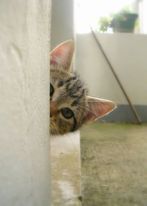
When we go green we naturally think of adding beneficial plants both to our yard and indoors. Unfortunately, many of these plants can cause illness and death to our furry family members and it is extremely important you know which ones are toxic. Animals tend to consume plants as a natural way to improve their health. For example, cats normally eat grass for nutrition, as well as to induce vomiting for the removal of hair balls. Common indoor and outdoor plants can cause illness, and in extreme cases, death. Cats may scratch plants and become infected when grooming their claws. Dogs may randomly chew or eat plants that emit intriguing scents. Therefore, it is important to be familiar with the types of plants in your area, and to keep the toxic ones out of your pets’ paths.
Catnip is an example of a relatively harmless plant that simply intoxicates the
Catnip is an example of a relatively harmless plant that simply intoxicates the
kitty. But, other common house and yard plants have lethal effects on our animal friends. Plants that you should avoid if you have outdoor pets are Daphne, Holly, Hyacinth bulbs, Iris, Lantanas, Laurel, Lily of the Valley, Rhododendron, Daffodils, Tiger lilies, and leaves from avocado, rhubarb, spinach and tomato.
Indoor plants can be as poisonous as well. Dieffenbachia inflames the mouth and lips of some dogs and cats. It may also interfere with breathing and swallowing. Philodendron has been known to cause irritation of the mucous membranes and excessive salivation in cats. Indian rubber plants are also toxic. Dried flower arrangements are a beautiful addition to a home’s decor, but often contain toxic plants. Hydrangea and bittersweet have been known to provoke gastroenteritis. Furthermore, the ingestion of bittersweet can result in unconsciousness. Some holiday plants can be dangerous to your pet. Mistletoe, if eaten, can be lethal to a dog. Poinsettias may cause vomiting, and even death to any household pet. Even Christmas tree needles and the water from the base of the tree can provoke gastrointestinal distress. Easter lilies are poisonous to cats.
Symptoms of plant poisoning are breathing difficulties, convulsions, excessive salivation, gastric distress, irritation of the mouth and lips, skin rash, swallowing with difficulty, vomiting, watery eyes and nose. If your pet encounters any of these symptoms call the veterinarian immediately! You might not be able to identify harmful plants yourself, but observe the vegetation and report anything that you find suspicious or unfamiliar to the veterinarian. They will then be able to offer better treatment when they know the entire story.
~ Nina is the author of the book, "Super Nutrition for Dogs n’ Cats" www.safegoodspub.com
Indoor plants can be as poisonous as well. Dieffenbachia inflames the mouth and lips of some dogs and cats. It may also interfere with breathing and swallowing. Philodendron has been known to cause irritation of the mucous membranes and excessive salivation in cats. Indian rubber plants are also toxic. Dried flower arrangements are a beautiful addition to a home’s decor, but often contain toxic plants. Hydrangea and bittersweet have been known to provoke gastroenteritis. Furthermore, the ingestion of bittersweet can result in unconsciousness. Some holiday plants can be dangerous to your pet. Mistletoe, if eaten, can be lethal to a dog. Poinsettias may cause vomiting, and even death to any household pet. Even Christmas tree needles and the water from the base of the tree can provoke gastrointestinal distress. Easter lilies are poisonous to cats.
Symptoms of plant poisoning are breathing difficulties, convulsions, excessive salivation, gastric distress, irritation of the mouth and lips, skin rash, swallowing with difficulty, vomiting, watery eyes and nose. If your pet encounters any of these symptoms call the veterinarian immediately! You might not be able to identify harmful plants yourself, but observe the vegetation and report anything that you find suspicious or unfamiliar to the veterinarian. They will then be able to offer better treatment when they know the entire story.
~ Nina is the author of the book, "Super Nutrition for Dogs n’ Cats" www.safegoodspub.com

 RSS Feed
RSS Feed

